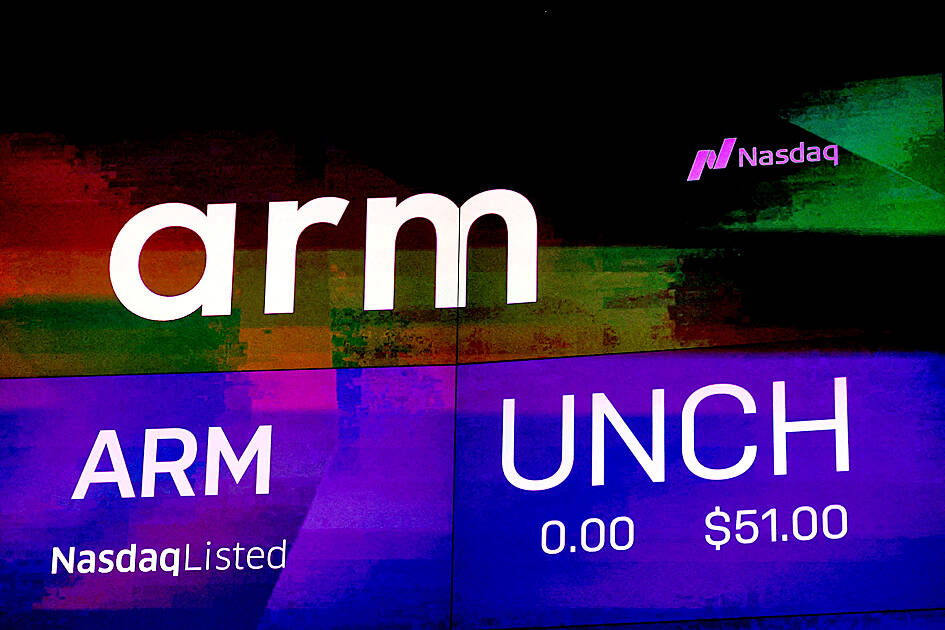Arm Holdings PLC’s Chinese venture is appointing a local chip veteran to be its new chief executive officer, seeking to consolidate leadership to better navigate fast-paced geopolitical and technological shifts.
Arm China plans to tap Chen Feng (陳鋒), a former executive at Fuzhou, Fujian Province-based chipmaker Rockchip Electronics Co (瑞芯微電子), according to people familiar with the matter. The appointment will be made after this week’s Lunar New Year holiday, they said.
Liu Renchen (劉仁辰) and Eric Chen (陳恂) will resign their posts as co-CEOs, the people said. Fang Fenglei (方風雷), founder of joint venture partner Hopu Investment Management Co (厚樸投資管理), is Arm China’s chairman, one of the people said.

Photo: Reuters
Chen Feng’s appointment closes the chapter to a tumultuous period for Arm’s China outpost. The new CEO will be in charge of helping the Cambridge, UK-based company adapt to a changing landscape as the prospect of cheaper artificial intelligence (AI) creates new tech winners and losers: Chinese start-up DeepSeek’s (深度求索) arrival as a serious contender to OpenAI and Meta Platforms Inc sparked a US$1 trillion rout on Monday. That threatens to upend assumptions in the lucrative datacenter market that the semiconductor designer is now targeting.
The two co-CEOs have served as interim leaders of Arm China since the 2022 ouster of former CEO Allen Wu (吳雄昂), who was fired in 2020 for alleged conflicts of interest but refused to leave.
A leadership vacuum emerged, with the co-CEOs juggling commitments elsewhere, according to people familiar with Arm China’s operations. Liu is affiliated with the Research Institute of Tsinghua University in Shenzhen, while Eric Chen, who joined the board while a managing partner at the Softbank Vision Fund, is co-founder of ParityBit Technologies, one of the people said.
Given the limitations on the two co-CEOs’ time, the board appointed Chen Feng to be sole, full-time CEO to help the joint venture better navigate the fast-paced technological and geopolitical shifts of the industry, two of the people said.
Arm — whose chip designs are used in most of the world’s smartphones including Apple Inc’s iPhone — is on the front lines of a US-China technological rivalry that has resulted in US-led export curbs on the most advanced AI chips. Arm and other US businesses operating in China are grappling with growing tensions as Beijing warily eyes US President Donald Trump’s “America First” policies and his threats of more tariffs.
Majority-owned by Japan’s Softbank Group Corp, Arm sells chip designs and licenses code that helps software communicate with processors.

Taiwan’s foreign exchange reserves hit a record high at the end of last month, surpassing the US$600 billion mark for the first time, the central bank said yesterday. Last month, the country’s foreign exchange reserves rose US$5.51 billion from a month earlier to reach US$602.94 billion due to an increase in returns from the central bank’s portfolio management, the movement of other foreign currencies in the portfolio against the US dollar and the bank’s efforts to smooth the volatility of the New Taiwan dollar. Department of Foreign Exchange Director-General Eugene Tsai (蔡炯民)said a rate cut cycle launched by the US Federal Reserve

The US government on Wednesday sanctioned more than two dozen companies in China, Turkey and the United Arab Emirates, including offshoots of a US chip firm, accusing the businesses of providing illicit support to Iran’s military or proxies. The US Department of Commerce included two subsidiaries of US-based chip distributor Arrow Electronics Inc (艾睿電子) on its so-called entity list published on the federal register for facilitating purchases by Iran’s proxies of US tech. Arrow spokesman John Hourigan said that the subsidiaries have been operating in full compliance with US export control regulations and his company is discussing with the US Bureau of

Businesses across the global semiconductor supply chain are bracing themselves for disruptions from an escalating trade war, after China imposed curbs on rare earth mineral exports and the US responded with additional tariffs and restrictions on software sales to the Asian nation. China’s restrictions, the most targeted move yet to limit supplies of rare earth materials, represent the first major attempt by Beijing to exercise long-arm jurisdiction over foreign companies to target the semiconductor industry, threatening to stall the chips powering the artificial intelligence (AI) boom. They prompted US President Donald Trump on Friday to announce that he would impose an additional

Pegatron Corp (和碩), a key assembler of Apple Inc’s iPhones, on Thursday reported a 12.3 percent year-on-year decline in revenue for last quarter to NT$257.86 billion (US$8.44 billion), but it expects revenue to improve in the second half on traditional holiday demand. The fourth quarter is usually the peak season for its communications products, a company official said on condition of anonymity. As Apple released its new iPhone 17 series early last month, sales in the communications segment rose sequentially last month, the official said. Shipments to Apple have been stable and in line with earlier expectations, they said. Pegatron shipped 2.4 million notebook